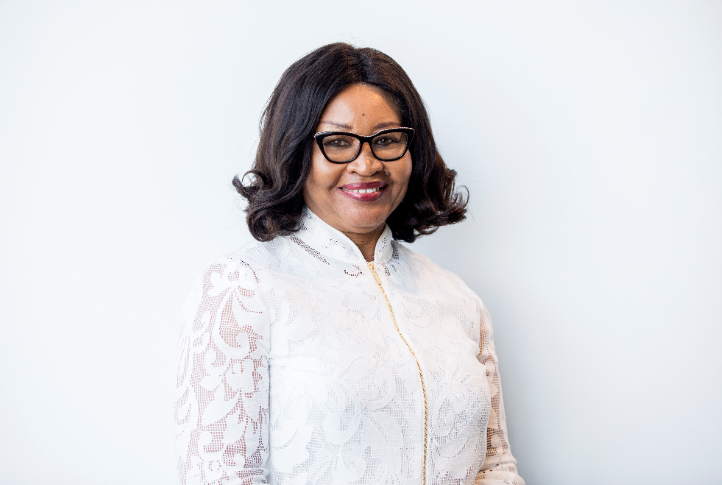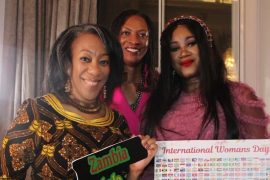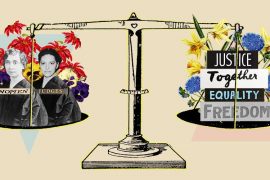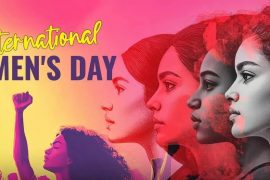The novel coronavirus (COVID-19) pandemic is impacting everyone, but some are more likely to have a drastic impact than others. Recent data from UNFPA show that the economic and physical disruption, engendered by the disease, have a more catastrophic impact on women and girls around the world with evidence of an increase in violence against women and girls, the world over.
Finding the “new normal” is a challenge for many families as schools and daycare centres yet remain closed with an end to this phase still unknown. For a number of families with dependent children, it could mean making big changes in everyday routines due to the financial, emotional and physical implications of the pandemic and resultant lockdown. For other families, it could mean raised anxiety in children, the tension in parenting relationships or general fear.
In an exclusive interview with Amazons Watch magazine, Dr Ije Jidenma, a mother of two, and a human resource professional with decades of experience in executive management and non-executive board roles shares her experiences and some of her mechanisms for other women to adopt to cope with the disruption arising from the novel pandemic. She also gave voice to the recent surge in gender-based violence in the country.
Excerpt:
Please describe yourself to us in a few sentences.
I am a self-driven and largely intrinsically motivated person. Highly analytical, yet creative, I am strategic in my orientation and strive to put things in their right perspectives. I believe in the nature-nurture interplay and complementarity and synergy of the diverse talents which God has implanted in human beings. My objective is to do my best in my sphere of influence to bring out these latent talents, help sharpen and shape them for the overall good of humanity in general, and the African continent where I find myself, in particular. Africa appears to be lagging behind in development but had undoubtedly been at the core of human history.
In the last thirty-five years, I have played varied roles in functional as well as executive management and non-executive board roles that include Learning & Development, Human Resources Management, Strategic Planning, Organizational Development, Business Psychology and Corporate governance in sectors that include Public sector, Financial Services & Banking as well as Professional Services within organizations that include Industrial Training Fund, Price Waterhouse ( now PwC), Leading Edge Consulting, First Pension Custodian, First Bank, etc My consulting roles have enabled me to make solid contributions to varied organizations that range from indigenous to multinationals, multilateral organizations, and leading international NGOs. I currently serve as the Chief Executive Officer of Leading-Edge Consulting, a consulting firm that I founded about twenty years ago and also serve as the Managing Partner of IRC Global Executive Search Partnership, Lagos, a global alliance with offices in 90 cities, across 6 continents. I also serve in other capacities such as a Director of First Bank of Nigeria, First Vice President of the Institute of Directors, Nigeria, Director of Nigeria South Africa Chamber of Commerce, Executive Secretary of Goddy Jidenma Foundation among other multi-faceted roles. Through these avenues, I strive to contribute my talent, time and treasures as commanded in the good book.
I believe in hard work and continuous learning and have attended several Executive Development and Non-Executive Board-level programmes across the world. These include Harvard Business School, Lagos Business School, Kellogg School of Management, and Cranfield School of Management among others. I am a strong believer in the even distribution of God-given talents across the human race and strive to elevate the African trajectory and narrative at the global stage.
I do render humanitarian service in my spare time and have served as a President of Soroptimist International, Surulere, a Paul Harris Fellow of Rotary International and a member of the premier Advisory Boards of Benola, a cerebral palsy initiative and Arthur Mbanefor Digital Research Centre, Lagos. I currently sit on the Advisory Board of the Centre For Values In Leadership, CVL.
The impacts of COVID-19 are worse for women and girls. Compounded economic impacts are felt especially by women and girls who are generally earning less, saving less, and holding insecure jobs or living close to poverty. Also, unpaid care work has increased for women, with children out-of-school, heightened care needs of older persons, and overwhelmed health services. As a mother of two, what are some of the measures you have adopted, and you would advise other women to adopt to cope with this current challenge?
The severity of the disruption of the COVID-19 pandemic to the economic, social and psychological well-being of individuals cannot be overemphasized. It is not surprising that women, elderly persons and children largely bear the brunt of the COVID -19 pandemic because of their level of vulnerability in the society. As an older person who is at a high risk of contracting the virus, I have adopted strict safety measures in my household, like not entertaining guests, for the time being. Ensuring that cleanliness is of high priority for everyone around me and also adopted a more healthy meal plan that will help improve the immunity of members of the household. I have also, in my little way, financially supported and educated women around me to enable them to cope with the current challenge, apart from my general financial contributions through the several platforms I belong to. For my children, I am challenged to give them psychological and spiritual support beyond physical and physiological needs. This time calls for togetherness and reassurance in order to maintain a stable and healthy mental state.
Nigeria, like many countries, has been adversely affected by the pandemic. From the slump in the crude oil price to disruption of the supply chain, Nigerian businesses have been impacted and are already being affected by COVID-19 disruptions, as the economy is now heading towards a second recession in less than four years. How has this crisis impacted your business operations?
I believe that disruption oftentimes breeds Innovation, which is the case with the Covid-19 pandemic. Take Nigeria for instance; we have been over-dependent on crude oil as our main source revenue while neglecting other important sources like the SMEs, Agriculture, Entertainment, Tourism etc. The global decrease in oil prices and lack of economic diversification has led to a myriad of economic problems currently plaguing the country. I hope this serves as a wakeup call for our Government and peoples. Now is the time to prioritize and cut off wastes. It is also a time to be more strategic and forward-thinking.
At Leading Edge Consulting, we have, to a great extent, adapted to the “New Normal” in our business operations. We are taking seriously safety measures outlined by the NCDC and have embraced Digital Transformation as a strategic tool in driving a successful business in this era. We have instituted Webinar series to help educate the various players in our economy. Decision-makers and implementers on how best to work harmoniously in organizations at individual, team and enterprise-wide levels whether we are working virtually, physically or even in a hybrid context. We are also looking at the overall wellbeing of individuals in a way that makes them achieve physical, mental and spiritual balance.
Many Nigerians are losing jobs or income, while some have been sent home on unpaid leave due to the impact of COVID-19 on businesses. The vast majority of people outside of the formal sector have been hit devastatingly by the lockdown. How concerned are you with the devastating circumstances, and how have you been responding to the situation?
It is indeed a difficult period requiring a delicate balance between health and economic demands. In third world countries such as Nigeria, there are slums and several abodes of people that are mass populated, so social distancing is ruled out. It is a challenge to provide adequate palliatives for such numbers of people. Many work in the informal sector and fend for themselves on a daily basis and cannot afford to be ‘locked down ‘.
There are limited buffers in terms of insurance and healthcare. This has brought about instability, anxiety and mental health issues such as suicide. On my own part, I have made significant financial contributions through many platforms that I belong to, such as neighbourhood, professional, alumni, peers and even directly to distressed individuals. We need to take into consideration our peculiar circumstance. It is difficult for the Government and even groups of concerned individuals to fully meet the needs of the people at this time, given that the informal sector is a significant part of our economy. A carefully thought out stratification is needed now and not a blanket lockdown. For instance, nothing stops individual farmers from going about their businesses since they can effectively maintain social distancing while applying other COVID-19 protocols. Also, it can be varied from state to state depending on the prevailing circumstance; even a Local Government Area can be shut down, while others are not or some markets opened while others are not on a case by case basis. Overall, I believe that our Government should do more by identifying specially challenged members of society and providing them with safety nets. And also ensuring that our medical teams are well catered for through the availability of required insurance packages, allowances etc. so that they can give their best service to the nation.
Recent studies have shown that economic stress on families due to the outbreak put children, and in particular girls, at greater risk of exploitation, child labour, and gender-based violence. What is your take on this?
There have been increasing incidents of rape and harassment of women. There was a recent case of the gang-rape of a female undergraduate student in one of our universities in a church where she went to study. This is abhorrent. Even though a number of NGOs have taken up the advocacy for the protection of the girl child and women from abuse, this is now time for parents to pay attention to the way they bring up their male children. We now involve men (whom we term Champions) in our advocacies so that the historical marginalization of women is well appreciated with the action plan set by both men and women. A good example is the Institute of Directors, Nigeria, Women Directors Committee annual conference and business luncheons.
Women’s fundamental role of fending for the family has exposed them to a lot of pressure in trying to make ends meet. The limited resources have led to child labour and in some cases, to gender violence.





Comments are closed.